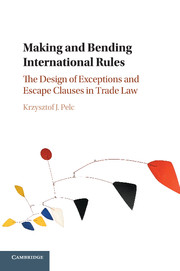Book contents
- Frontmatter
- Dedication
- Contents
- List of Tables
- Acknowledgments
- 1 The “Architectural Challenge” of International Rules
- 2 A Theory of the Design of Flexibility
- 3 A Brief Intellectual History of Flexibility in Law
- 4 The Twin GATT Exceptions: Fears and Solutions
- 5 The Evolving Design of Flexibility
- 6 The Bad News
- 7 The Good News
- 8 The Great Recession and Beyond
- Bibliography
- Index
3 - A Brief Intellectual History of Flexibility in Law
Published online by Cambridge University Press: 05 September 2016
- Frontmatter
- Dedication
- Contents
- List of Tables
- Acknowledgments
- 1 The “Architectural Challenge” of International Rules
- 2 A Theory of the Design of Flexibility
- 3 A Brief Intellectual History of Flexibility in Law
- 4 The Twin GATT Exceptions: Fears and Solutions
- 5 The Evolving Design of Flexibility
- 6 The Bad News
- 7 The Good News
- 8 The Great Recession and Beyond
- Bibliography
- Index
Summary
In this chapter, I want to draw a brief intellectual history of flexibility in law, tracing the treatment of two of its main provisions through time. This brings me to topics that readers of a book on global governance and international trade may not have expected to encounter – the theft of bread, fishing for herring, burning houses, impotence, and shipwrecks, among others. Yet the eclecticism is warranted. My first objective in this chapter is to demonstrate that for nearly as long as there have been rules to constrain behavior, there have been additional rules put in place to sanction transgressions in specified circumstances. And these, in turn, have systematically led to discussions over how best to design exceptions.
Formal escape clauses exist not only in economic agreements, but also among rules of a fundamentally normative character, such as religious edicts and human rights treaties, where it might be thought that exceptions could not be justified. In all cases, we observe a consistent concern over the abuse of loosely defined exceptions, and when these concerns reach a peak, we regularly see the emergence of informal norms against their use, which in turn are often followed by formal reform. This is the fate that befalls Bismarck's favored exception to international treaties, which European heads of state made a habit of invoking during the nineteenth century to break commitments at their whim. The notion that “changed circumstances” allow the suspension of a treaty, the legal status of which evolves over time, becomes a case-study for how states behave when presented with overly loose escape provisions. This examination of the handling of “changed circumstances” serves as a rehearsal for countries’ treatment, a century later, of the GATT's security exception, another largely unconstrained source of flexibility.
The scope and nature of laws changes with time, but their treatment of exception remains strikingly constant. With the emergence of the state, the discussion of flexibility provisions in rules governing relations between individuals is progressively applied to that governing the social contract. The fear of abuse remains, but it now concerns the leaders themselves.Yet the proposed solutions to prevent these abuses are analogous to earlier treatments. Similar continuity marks the emergence of international law governing inter-state behavior.
- Type
- Chapter
- Information
- Making and Bending International RulesThe Design of Exceptions and Escape Clauses in Trade Law, pp. 43 - 92Publisher: Cambridge University PressPrint publication year: 2016

